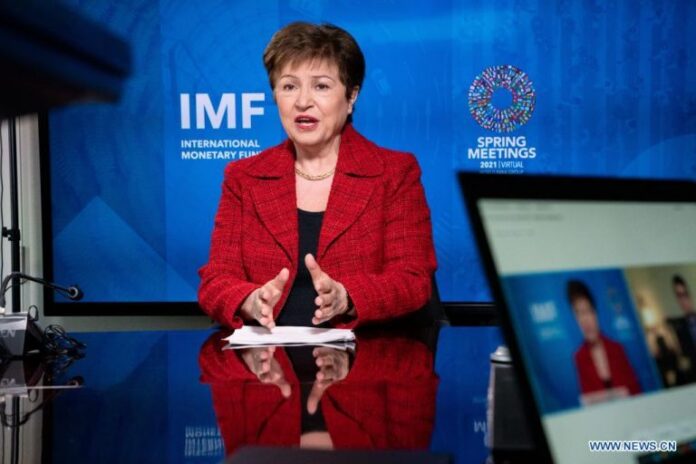Ms Kristalina Georgieva, the Managing Director, International Monetary Fund (IMF) has urged policymakers to urgently “act now and act together’’ to address the global crisis.
Georgieva said this in her opening remarks at the IMF/World Bank Group Annual Meetings 2022 news conference held in Washington DC.
A copy of the managing director’s speech was published on the IMF’s website on Friday.
“As we gather, we face a difficult global environment. The world economy has been hit by one shock after another, COVID, Russia’s invasion of Ukraine, and climate disasters on every continent.’’
She said these shocks had continued to harm people’s lives, and caused a cost-of-living crisis, adding that repeated shocks and growth setbacks raised a bigger question.
“Are we experiencing a fundamental economic shift in the world economy from a world of relative predictability and stability, to greater uncertainty and volatility?
“What does this mean for policymakers? It is a much more complex time, which requires steady hands at the policy levers.
“That brings me to our Global Policy Agenda. Let me give you a few highlights. We are appealing to policymakers to act with a sense of urgency now and to act together.
“We see very clear areas where we can do better, even in this more complex environment.’’
Georgieva said the first thing was to bring inflation down, saying that rising interest rates came at a cost to growth.
“But we also know that not tightening enough to put a leash on inflation would mean interest rates staying higher for longer, resulting in even more harm to growth and people.’’
She said for central banks, this meant taking decisive action when necessary, and communicating clearly.
Georgieva said the second step was to “act now’’ to put in place responsible fiscal policy, adding that protecting vulnerable households and businesses must be prioritised.
“But we have to do that at a time when fiscal buffers are exhausted because of the pandemic and levels of debt are very high. The obvious conclusion is that policy measures need to be temporary and well-targeted.’’
She said policymakers should steer away from across-the-board fiscal support that is neither effective nor affordable.
According to her, if we are to help people and fight inflation, we must ensure that fiscal and monetary policies go hand in hand.
“When monetary policy hits the brakes, fiscal policy should not step on the accelerator that would make for a very dangerous ride.’’
Georgieva said the third step was for policymakers to act now to safeguard financial stability, particularly as there were rising financial sector risks.
“Macro prudential policies need to be even more vigilant and proactively address pockets of vulnerability. In this environment, we also must support vulnerable emerging markets and developing countries.
“It is tough for everybody, but it is even tougher for countries that are now being hit by a stronger dollar, high borrowing costs, and capital outflows, a triple blow that is particularly heavy for countries that are under a high level of debt.’’
She said transformational reforms were needed to address climate change, make digitisation work for people, and address inequality.
“To confront these issues, we must act with a sense of urgency now, and we must act together. The IMF is working with our 190 members on these issues.
“Our economic analysis is front and centre to help countries navigate this complex environment and avoid policy mistakes.’’
The managing director said since the pandemic began, the fund had provided 260 billion dollars in financial support to 93 countries.
She said that since Russia’s invasion of Ukraine, the IMF had supported 18 new and augmented programmes with close to 90 billion dollars, and 28 additional countries were expressing interest in receiving support from the fund.
“That comes on top of the 650 billion dollars Special Drawing Rights (SDR) allocation. We have an ambition of 100 billion dollars of on-lending of SDRs from countries in a strong position.
“Where are we? We have just crossed over 80 billion dollars, and we are determined to reach the target in the coming months.’’
Georgieva said the IMF had created its first ever long-term financing instrument to support the transformation of economies called the Resilience and Sustainability Trust which was now operational.
“We have pledges of 40 billion dollars, and staff-level agreements for the first three countries: Barbados, Costa Rica, and Rwanda.’’
She said for countries suffering from the food crisis, the fund had expeditiously opened emergency financing called the Food Shock Window to provide rapid financing for urgent needs.
The managing director said the IMF was pressing for a more effective debt resolution mechanism.
According to her, we want the G20 Common Framework to become more predictable, with clear guidelines and equality of treatment for all creditors, public and private.
“We are also looking for ways to expand that kind of donor coordination to middle-income countries, such as Sri Lanka.
“We must act urgently, and act together to make a difference in the lives of hundreds of millions of people.’’




